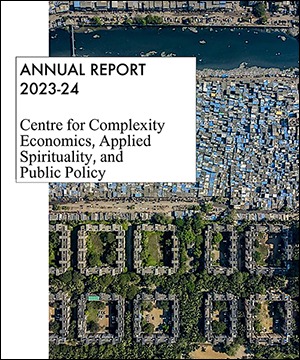Centre for Complexity Economics, Applied Spirituality and Public Policy
October 17, 2023 2024-08-27 11:38Centre for Complexity Economics, Applied Spirituality and Public Policy
Centre for Complexity Economics, Applied Spirituality, and Public Policy
Centre for Complexity Economics, Applied Spirituality, and Public Policy
The Centre for Complexity Economics, Applied Spirituality and Public Policy (CEASP) was envisaged during an international conference Jindal Conference on Applications of Quantum Modeling and Complexity Theory to Economics and Public Policy held during February 19-20, 2020, at Jindal Global University. The Centre came into existence in September 2020.
CEASP strives to have vibrant teaching programs as well as strong research collaborations (both at the national and international levels) on the forefront areas of Complexity Economics, Applied Spirituality and Public Policy, along the vision of Jindal School of Government and Public Policy.
Complexity economics is the study of the economy as a complex adaptive system with the intriguing characteristics of non-linearity, feedback loops, self-organization, emergence, etc. These complex economic-financial systems are very challenging to analyze and model. While mainstream economics has resulted in a rich body of mathematical theory and public policy practice over a long history, over the years several fault lines and limitations have also surfaced which are now being addressed by novel interdisciplinary approaches such as complexity theory, behavioral economics, econophysics, quantum decision theory, etc.
The current dominant socio-economic systems are primarily driven by a growth imperative, which can be marred by human greed, selfishness, etc., especially on issues such as energy consumption and climate change. This often leads to severe socio-economic inequalities, etc. that are detrimental for the sustainable development of the society as well as humanity, and hence poses a challenge in public policy at a civilizational scale. While fundamental shifts in the ways we traditionally study and design economic systems have become the need of the hour, they may not be enough. We have to delve into the domain of spirituality and the core of what it is to be human. Thus, we must complement our work on complexity economics with applied spirituality to foster public policies which seek ecological integrity, social justice, and economic effectiveness.
The members of the CEASP come from a wide range of domains like economics, physics, sustainable growth and development, public policy and governance, etc. and work hand-in-hand with leading experts across the globe to give shape to the objectives of the Centre. The Centre for Complexity Economics, Applied Spirituality and Public Policy (CEASP) will advance teaching, research, and advocacy of public policies and related processes that draw from complexity economics and applied spirituality to foster ecological integrity, social justice, and economic effectiveness.
The Centre for Complexity Economics, Applied Spirituality and Public Policy (CEASP) will advance teaching, research, and advocacy of public policies and related processes that draw from complexity economics and applied spirituality to foster ecological integrity, social justice, and economic effectiveness.
- The primary aim of the Centre is to build networks among interested faculty and students, nationally and internationally, and develop a community of practice among policymakers and practitioners.
- The Centre will consider providing opportunities for research scholars to meet and engage, and to resolve public policy challenges through the lenses of complexity economics and applied spirituality.
- The approach will be transdisciplinary drawing from related fields of complexity theory, behavioral economics, psychology, post-growth economics, econophysics and sociophysics, quantum decision theory, artificial intelligence, sustainability science, law, etc.
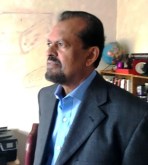 Prof. Naresh Singh
Prof. Naresh Singh
Director CEASP
Email: naresh@jgu.edu.in
Dr. Singh is currently Professor at the Jindal School for Government and Public Policy; Special Adviser on Sustainability at the Toronto Centre for Financial Leadership and Senior VP at Global Development Solutions Canada, a strategic advisory services firm.
His scholarly work on complexity theory started 25 years ago in his search for a theory of sustainable development during his tenure as Program Director at the International Institute for Sustainable Development, in Canada at which time he pioneered the work on sustainable livelihoods. His visit to the Santa Fe instituted strengthened his desire to pursue this work. Later as the Canada Trust visiting professor at the University of Waterloo, he helped advance work the systems approach to measuring sustainability with Professor James Kay. As a visiting scholar at the Harvard University’s Global Equity Initiative he did work on the societal systems approach to HIV/AIDs. More recently he has been working with complexity-based approaches to Integrative Peace Building at St. Paul University in Ottawa. Since 2018 he has taught a professional development course on “Policy and Program Design and Evaluation in Complex Situations” at the University of Ottawa. His book chapter: “Development as Emergent Creativity” is in press. Dr. Singh has been a senior policy adviser to the Governments of the Caribbean, the Canadian Government, the United Nations and several of its member States and the Commonwealth.
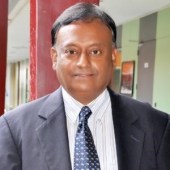 Professor R. Sudarshan
Professor R. Sudarshan
Founding Member, CEASP
Email: rsudarshan@jgu.edu.in
Prof. R. Sudarshan has had distinguished careers in the domains of research, development programming and governance. After he obtained a Master’s degree in Economics from the Delhi School of Economics he was elected to a Rhodes scholarship. He joined Balliol College, University of Oxford, and obtained a Master’s degree in Politics in 1977. He was elected to a research fellowship at St. John’s College, University of Cambridge, where he studied judicial review of economic legislation by the Supreme Court of India, specializing in the interface of law and economics. In 1983 he was a visiting scholar in the School of International Development, University of East Anglia.
In 1984 he served in the Ford Foundation’s South Asia Office in New Delhi as Assistant Representative and Program Officer for Human Rights and Social Justice. In 1991 he joined the UNDP in India as Senior Economist and Assistant Representative for Governance and Public Policy. In 2000 he served UNDP in Jakarta as its Senior Governance Advisor. In 2002 he was appointed Policy Advisor for Justice and Governance in the UNDP Oslo Governance Centre. In 2005, he was transferred to the UNDP Asia-Pacific Centre in Bangkok, where he was Regional Policy Advisor for Governance, Human Rights, Rule of Law, Justice, and Legal Reforms.
In 2012 he joined the O.P. Jindal Global (Institution of Eminence Deemed To Be University) as the founding Dean of the Jindal School of Government and Public Policy. He has an impressive track record of publications comprising books, articles, and UN policy reports, reflecting his inter-disciplinary research, teaching and policy experience in development programmes, human development, law, governance, institutions, and policy.
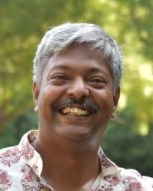 Prof. Anirban Chakraborti
Prof. Anirban Chakraborti
Founding Member, CEASP
Email: achakraborti@jgu.edu.in
Personal Webpage [here]
Anirban Chakraborti is a Professor at the School of Computational and Integrative Sciences, Jawaharlal Nehru University, New Delhi. Earlier, he had worked as an Associate Professor at the Chair of Quantitative Finance, École Centrale Paris, France, and as a Lecturer in Theoretical Physics, Banaras Hindu University, Varanasi. He obtained a Ph.D. in Physics from Saha Institute of Nuclear Physics, India and later completed the Habilitation (HDR) in Physics from Université Pierre et Marie Curie (Paris VI), France. He has more than two decades of experience as a scientist, working in many reputed universities and research institutions in India, Europe, Japan, and USA. He was awarded the prestigious Young Scientist Medal of the Indian National Science Academy in 2009. His scholarly works include several books, edited volumes, book chapters and research articles, which have received international acclaim. His main research interests lie in the areas of Econophysics, Sociophysics, Data Science, Complex Systems, Statistical Physics, Quantum Physics and Nanomaterial Science.
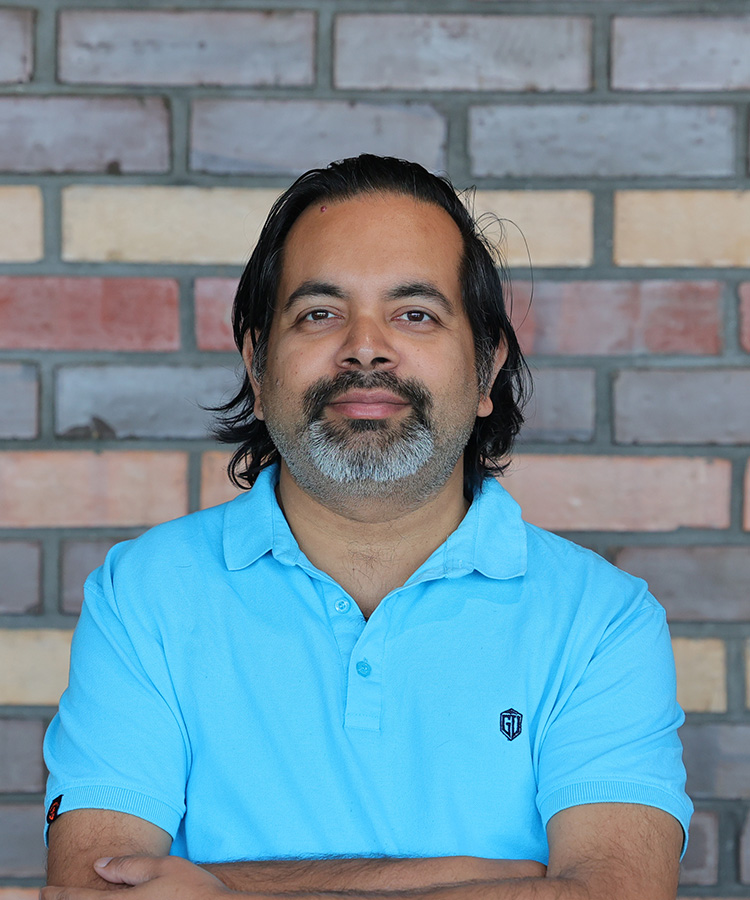 Dr. Sudip Patra
Dr. Sudip Patra
Email: spatra@jgu.edu.in
Dr Sudip Patra is working as Associate Professor at JSGP, and is a founding member of CEASP (complexity economics, applied spirituality and public policy research center). Sudip has earned his PhD in mathematical modelling in Finance from University of Glasgow, Scotland, with a prior Physics background. His research works are in emerging fields of quantum-like modelling, complexity economics and quantum foundations. Sudip has been invited or visitor in different prestigious institutes, for example IIT Bombay, Aston University, UK, Chengmai University, Thailand. Sudip is collaborating with pioneering Scientists (Menas Kafatos, Stuart Kauffman or Partha Ghose) in above mentioned research fields. At JSGP Sudip is also associated with the Policy Lab.
Sudip has also done associate fellowship in higher education, UK, and his teaching responsibilities are in the areas of complexity economics, behavioral economics, Indian economic analysis, provided across bachelors, masters and graduate levels.
Dr Patra is now involved in some projects related to quantum-like framework in decision science, and in quantum foundations. A book project with eminent Indian Scientist Professor Partha Ghose is developing, where a new framework of decision-making is built, which the authors call Hilbert space modelling of cognition. This framework is based on philosophical principles, namely, Contextuality creating realities, ontological uncertainty in cognition, and entanglement like structures in cognition. The mathematical language is based on quantum science, but there are foundational differences also, for example, there is no need for a physical quantization rule, or the use of Plank’s constant, which is at the heart of quantum mechanics. The book project is estimated to be finished by a couple of months. Sudip is working with Scientist Menas Kafatos in the direction of quantum foundations, where they jointly explore a world view they call ‘quantum-like’ reality, where broader philosophical principles are at the base, and there might be deep interlinkages between different disciplines. With Complexity Scientist Stuart Kauffman, Sudip has proposed a testable theory of emergence of classical world. Sudip is also research fellow at the Laszlo Institute of new paradigm research, Research Fellows – The Laszlo Institute.
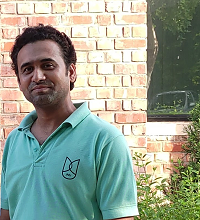 Dr. Syed Shariq Husain
Dr. Syed Shariq Husain
Email: syeds.husain@jgu.edu.in
Syed S. Husain has recently earned his doctorate from School of Computational and Integrative Sciences at Jawaharlal Nehru University, India. His research work is focused on studies of data-driven complex socioeconomic systems using interdisciplinary techniques and data science approaches. His main research interests include but are not limited to Complex Systems, Dynamical Systems, Socioeconomic Systems & Computational Social Sciences. He has a wide range of teaching/TA experience from the courses spanning from Social Networks and Epidemiology, Complex Systems, Complexity and Public Policy (JGU), Agent Based Modelling (ICTS), Statistical Computation and Nonlinear Dynamics. His research focuses on structure and dynamics of various complex systems using real-world data and the microscopic interaction resulting in group phenomena and thereby providing insight to data inspired policy recommendations. He presented his work at many places in India and abroad and has been a member of the Italian Physical Society in the past. At present, Dr. Husain is working on data, complexity & cities and climate change, socioeconomics/health & policy. He also has teaching experiences across diverse groups and varying disciplines to his credit.
- Virtual Panel Discussion on Quantum Social Science and Public Policy at JSGP. (youtube.com)
- Guest Lecture by Dr. Menas Kafatos (youtube.com)
- Quantum Explorations of the Universe with Menas Kafatos and Sudip Patra (youtube.com)
- Applied Spirituality and Public Policy | Dr. Naresh Singh (youtube.com)
- Professor Naresh Singh’s Insightful Address | UN International Day of Conscience 2024 (youtube.com)
- Applied Spirituality and Sustainable Development Policy | Dr. Naresh Singh & Ms. Divya Bhatnagar (youtube.com)
- Naresh Singh: Complexity Economics, Applied Spirituality and Public Policy (youtube.com)
- Inauguration of Centre for Complexity Economics, Applied Spirituality and Public Policy ( CEASP ) (youtube.com)
- (1110) Quantum Explorations of the Universe with Menas Kafatos and Sudip Patra – YouTube
- SESSION 6- QUANTUM-LIKE MODELLING IN SOCIAL SCIENCES (youtube.com)
- Quantum Computation: A New Frontier for FinTech (youtube.com)
- PANEL Discussion (youtube.com)
- Book talk on “Applied Spirituality and Sustainable Development Policy” (youtube.com)
- (1110) Book Launch – YouTube
- Fireside Chat
YouTube link https://www.youtube.com/watch?v=OD3KVvjOYgc
Date: Mar 31, 2021 - Panel Discussion On Quantum Social Science And Public Policy
Date and Time: October 21st, 2020. 7.30 pm IST
YouTube link https://www.youtube.com/watch?v=ZXW3bmpXHRk - Inauguration of Centre and Panel Discussion on ‘Complexity Economics’
Data and time: 23rd September, 2020 at 7.30pm
YouTube Linkhttps://youtu.be/1Lbc88Xvxls - Panel Discussion held on Applied Spirituality and Public Policy
Date and time: 24th November 8.30 pm to 10.00 pm IST ( 10.00 am to 11.30 am EST).
The youtube link https://youtu.be/63vkBfo-l9I - INTERNATIONAL CONFERENCE ON ARTIFICIAL INTELLIGENCE IN COMPLEX SOCIO-ECONOMIC SYSTEMS AND PUBLIC POLICY
INAUGURAL SESSION
Schedule and zoom link
Date and Venue: 20-22 January 2021
CEASP, Jindal School of Government and Public Policy, O.P. Jindal Global (Institution of Eminence Deemed To Be University)
Books
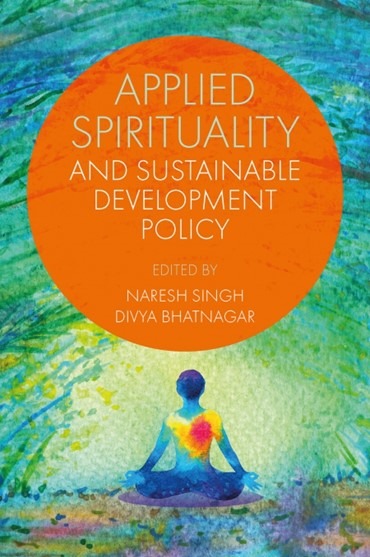 Book Name: Applied Spirituality and Sustainable Development Policy
Book Name: Applied Spirituality and Sustainable Development Policy
Edited by: Naresh Singh, O.P. Jindal Global University, India
Divya Bhatnagar, Shiv Nadar University, India
About the Book
The fundamental cause of many of the global challenges we are currently facing is our disconnection from ourselves, our fellow humans, other beings, and our planet. We have consistently failed to recognize the inner consciousness that dictates our relationships and decisions, an awareness that could be the first step toward humanity’s quest to set civilization on a more sustainable trajectory.
Rooted in both secular spirituality and scientific evidence, Applied Spirituality and Sustainable Development Policy articulates a new model of sustainable development that is not just based on narrow definitions of GDP and economic growth, but that includes and even forefronts social and environmental development and inner transformation of human beings. Drawing on fields from physics to public policy, 18 pioneering authors discuss:
- A distillation of the spiritual gems at the core of the world’s major religions, including Indic and Buddhist philosophy
- Root-cause analyses of major sustainable development policy challenges like climate change
- Connections between spirituality and law, and how our legal frameworks can reflect these values
- The need for leaders to understand their spiritual nature in order to be authentic and transformative in their leadership styles
Recognizing a global need for healing, this book rejuvenates how we think about development and nurture our innate spirituality, and challenges us to shift our collective mindset from one of having to one of being.
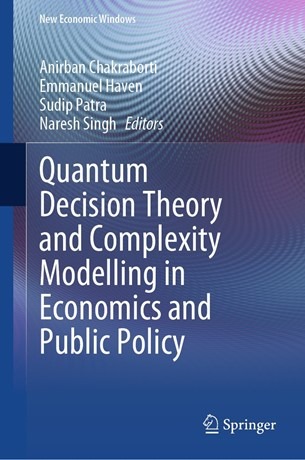 Book Name: Quantum Decision Theory and Complexity Modelling in Economics and Public Policy
Book Name: Quantum Decision Theory and Complexity Modelling in Economics and Public Policy
Edited by: Anirban Chakraborti, Emmanuel Haven, Sudip Patra, Naresh Singh
DOI: https://doi.org/10.1007/978-3-031-38833-0
About the Book
This book is an outcome of the interdisciplinary conference held at OP Jindal Global University (Quantum Decision-making and Complexity modeling, and their possible applications in social sciences- economics, finance and public policy). The volume builds upon the emerging fields of Econophysics, Complexity theory and Quantum like modelling in cognition and social sciences, and their plausible applications in economics and public policy. There can be deep linkages between the micro, meso and macro scales at which these paradigms operate. In this data-driven age, greater amounts of information, along with the facility to harvest, sort and process said information, have permitted an expansion of the capability to study a society’s various factors to a degree of detail and inclusiveness that has never before been available to researchers. As a result, an increasing number of throughlines is being discovered, revealing heretofore unknown connections between various disciplines and enhancing the study of such societal tropes as finance, language, shared behavior, and many others. As the reader will see, with clearer understanding of the interconnectedness of society’s assorted parts comes a clearer understanding of the society as a whole. We have received critical thoughts from noted experts in social and natural sciences to explore possible interconnections. The editors of this book earnestly hope that the critical reviews presented in this volume will stimulate further scholarly interest, but also interest among policy practitioners for the purpose of exploring possibilities for creating a new paradigm for comprehending pressing issues of deep uncertainty and emergence in social dynamics.
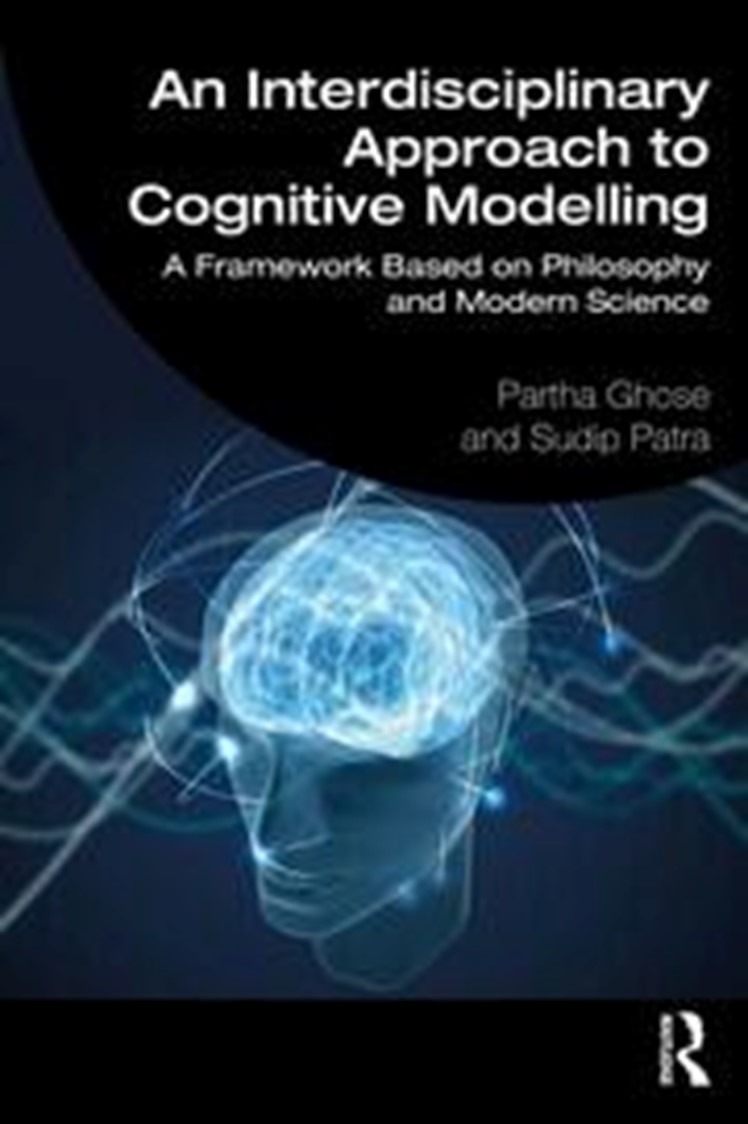 Book Name: An Interdisciplinary Approach to Cognitive Modelling
Book Name: An Interdisciplinary Approach to Cognitive Modelling
By: Sudip Patra and Partha Ghose
DOI: https://doi.org/10.4324/9781003429913
About the Book
An Interdisciplinary Approach to Cognitive Modelling presents a new approach to cognition that challenges long-held views. It systematically develops a broad-based framework to model cognition, which is mathematically equivalent to the emerging ‘quantum-like modelling’ of the human mind.
The book argues that a satisfactory physical and philosophical basis of such an approach is missing, a particular issue being the application of quantization to the mind for which there is no empirical evidence as yet. In response to this issue, the book adopts a COM (classical optical modelling) approach, broad-based but mathematically equivalent to quantum-like modelling while avoiding its problematic features. It presents a philosophically informed and empirically motivated mathematical model of cognition, mainly concerning decision-making processes. It also deals with applications to different areas of the social sciences.
It will be of interest to scholars and research students interested in the mathematical modelling of cognition and decision-making, and also interdisciplinary researchers interested in broader issues of cognition.
Papers
Cosmos, Mind and Life: Is Mind in Spacetime? by Stuart Kauffman, Sudip Patra :: SSRN
Quantum-like reality – Publications Repository (PURE) (jgu.edu.in)
Embracing Weird: Quantum Context and Quantum Social Sciences: Ingenta Connect
Entropy | Free Full-Text | A Testable Theory for the Emergence of the Classical World (mdpi.com)
What is Quantum Social Science approach?
And what we aspire in CEASP to achieve?
(www.jgu.edu.in/jsgp/ceasp)
Dr. Sudip Patra
The Jindal School of Government and Public Policy has set up a truly interdisciplinary center, Center for Complexity Economics, Applied spirituality and Public policy or CEASP. The center will explore some novel emerging paradigms, which can be extended to resolve pressing public policy issues, including social dynamical, economical and financial system problems, Quantum like modelling in social science or quantum social science (QSS) is one of the emerging paradigms. In this brief introduction we will just touch upon the basic framework of QSS, and also try to clarify any confusions relating to the same. References to relevant seminal works are provided in the end for interested readers. QSS is purely a novel exercise of extending and constructing suitable formalisms (mathematical and conceptual) based on widely practiced formalisms in physical sciences, mainly quantum mechanics and quantum field theory, to analyzing human decision making or social dynamics at large. Several advantages of this approach, have been demonstrated over the last few decades (references in the end), over standard neoclassical decision theory, or even standard behavioral economics or finance theories. We will attempt to discuss some of the advances in brief here. However, from the onset we need to be very clear that we are in no way suggesting any underlying physics of social systems. Social systems (political, economic, financial etc) are at a very high emergent level as compared to say particle physics level, and the beauty of emergent systems is that we need not bother tracking in full details the absolute microstates. Coarse graining is perfectly applicable. It is a significant shift from reductionism to holism.
However, various limitations in formal logical or mathematical models, for example in Boolean logic-based decision theory, Constrained Utility Maximization theory, or General Equilibrium theory in macroeconomics, have shown that there is a strong need to come up with more apt and coherent formalisms to describe real life behavior of decision makers. Quantum mathematical and logical formalisms have provided better resolutions. Certainly, the standard behavioral school, or schools of modelling too have responded to such limitations, but we claim that QSS is more suitable to provide coherent frameworks rather than more dispersed heuristics-based approaches.
Decision theory approach
Since the 1960s many cognitive scientists have noted in detail (for example Ellsberg Paradox, Linda Paradox, Prospect theory which are wonderfully summarized in the book ‘thinking fast and slow’) that typical Boolean Logic based decision-making models don’t explain many features of human decision making. Particularly decision making in a context of uncertainty .. In neoclassical economics, uncertainty has been mainly described with the help of classical probability theory, or modified by Bayesian updating rules, which then is supplemented with expected utility maximization models. But what about such scenarios where ambiguity is deep, and it is difficult to form ‘rational’ beliefs? In real life we face such scenarios often. Again, there are rare events like ongoing pandemic or financial crises, what might be better ways to deal with such phenomena in terms of decision making? Cognitive experiments for decades (well summarized in the book ‘quantum social science’) have shown people behave differently under such contexts compared to predictions of standard decision theories.
Real prisoner’s dilemma games are an example, where players don’t choose the typical dominant ‘defection’ equilibrium, when they are not at all in a context of forming beliefs about other players moves. Hence, scientists since late 90s (for example see the book ‘Ubiquitous Quantum Structure’) have suggested there might be a possibility for constructing a more general probability framework, which might contain the standard results but also help in describing so called deviations, or anomalies. It turned out that ‘quantum probability’ framework, which is a mathematical formalism based on description of states of a system in Hilbert space[1], and computing probabilities in such a space of events using ‘Born’s rule[2]’, could be such a comprehensive set up. Now there are stark differences between such a formalism and classical set theory-based decision modelling, but ONLY in the mathematical set up.. We will urge readers to look into the book ‘quantum social science’ for details.
It turned out from experimental data that rules used for computing probabilities in such a format provided results which described deviations from standard theories to a great extent. So much so that a new sub set of studies, called quantum decision theory, blossomed (refs in the end).
Quantum decision theory, or such mathematical formalisms have now been successfully applied to different aspects of real life decision making: psychological experiments, decision making in financial markets, legal decision making (a very new development). A pioneering text in this field is by Busemeyer and Bruza as in the references below. .
[1] Hilbert space is the state space where states and operators describing the system exists, it is a generalization of linear vector spaces, basically a complex, sesqulinear, Normed vector space, where an inner product is defined.
[2] Born’s rule states that the probability of obtaining one of the states from the initial superposition of states is given by the square of the amplitude (generally complex) for that state, this rule is the basis for computation in quantum theory.
Modeling social dynamical systems
The other sub set of study is applying mathematical or conceptual formalisms in different social dynamical systems. What we mean here is a system with many interacting parts, which evolves over time. For example, stock markets, or say post poll alliances between political parties, or say even more complicated ecological systems.
Agent based modelling is also a central concern for standard utility framework-based modeling, but multiple types of interactions between any number of stakeholders in a social system is very complicated if not impossible to capture via standard models. There is then a traditional ‘representative’ agent modelling bias still present, where all rational agents are considered homogenous and constrained utility maximizers, without enough scope of introducing different types of heterogeneity in sub sets of agents interacting with each other. Also, as some related disciplines like Complexity theory and Econphysics have shown, economy and also society as a whole can not be fully described as a general equilibrium system. Some researchers such as Fabio Bagarello have demonstrated that such limitations can be up to a good extent resolved using formalism which is widely used in quantum field theory. The so called ‘operator’ formalism used in quantum field theory is a mathematical language developed for analyzing systems with very large degrees of freedom. More specifically such a formalism is called as ‘ladder operator’ approach, where we build up the description of the system based on very simple mathematical objects known as raising and lowering operators. Such operators if acted upon say the vacuum state of a system (say for example in our case a state of stock market where no trading is present) higher excited states are resulted (say in our case how many stocks are traded in that instant). Then we just use various interesting algebraic relations between such operators to describe the system, such that different types of interactions between agents, or agents with the general information environment can be described. Finally, we proceed with a so called ‘Hamiltonian’ formulation for describing the time evolution of such a system.
As of now many numerical analysis or simulation results have provided good evidence of superior analyzing power of such a formalism. There are some other alternative formalisms available too, for example see the seminal book by Baaquiee Belal in the ref.
Way forward for us
We have just touched upon a few areas where quantum formalisms have been used with ongoing success and also evolution of the modellings themselves. For example, one of our main tasks is to apply our formalisms according to complex social systems, for which we need to deviate a lot from standard practices done in the domain of physics. Our language must speak of the social or ecological world which we like to decode. Our models then can provide critical feedbacks for policy makers to plan better strategies for battling pressing issues. At CEASP we are establishing world class collaborations to help define the way forward. Areas like SDG goals, or Policy making in deeply uncertain times, holistic policy making using ecology of mind, are central themes where quantum social science can contribute in understanding the underlying dynamics better.
REFS Haven, Emmanuel and Khrennikov, Andrei (2013), ‘Quantum Social Science’ Cambridge University Press.
Haven, Emmanuel, Robinson, Terry, and Khrennikov, Andrei, (2017), ‘Quantum methods in social science’, World Scientific.
Bagarello, Fabio, (2019), ‘Quantum concepts in Social, Ecological and Biological Sciences’, Cambridge University Press.
Busemeyer, J and Bruza, P (2012), ‘Quantum Models of Cognition and Decision’, Cambridge University Press
Khrennikov, Andrei (2010), ‘Ubiquitous Quantum Structure’, Springer.
Belal, Baaique, (2015), ‘Quantum Field Theory for Economics and Finance’, Cambridge University Press.
—————————————————————————————————————————-
Why the work of CEASP is important in addressing the wicked problems of today’s world
By Tanya Rana, Candidate of M.A. Public Policy
On complexity
In the inaugural address of Jindal School of Government and Public Policy’s new Centre – Centre for Complexity Economics, Applied Spirituality and Public Policy (CEASP), the “father of Complexity Economics” – W. Brian Arthur[i] – provided insights on the economic system as a system which is “open to change”, compared to the underlying mechanistic view defined by equilibrium thinking. From the ecology to food, political, or financial systems, the settings within which these systems operate are dynamic, interdependent, and non-linear, meaning that there exist “systems within systems within systems, and so on”[ii]. The agents forming a part of these complex systems “react to the patterns they together create, and that pattern alters itself as a result, causing the agents to react anew”. Economic Complexity critiques mainstream and non-equilibrium way of thinking as it filters exploration, creation, and transitory phenomena of adjustment, adaptation, innovation, and the history itself[iii]. Some of our pertinent public policy challenges can also be tackled through the lens of Complexity. Case in point is the COVID-19 pandemic, where inequities in our health and other social systems, severe economic inequalities, and inability of large swathes of society to cope and recover, have blatantly resurfaced. How should we then address public problems?
Addressing wicked problems through public policy process The term “wicked problem” was introduced in 1973 by two design theorists namely Horst Rittel and Melvin Webber to highlight the “complexities and challenges of addressing planning and social policy problems”. Real-world wicked problems of the day such as climate change or deviation of financial markets’ performance from their real economies, causing bubbles and crashes, present no easy solutions because of their uniqueness, indeterminate formulation, and so on[iv]. The patterns, arising out of inpidual behaviours or existing patterns that create incentives for such behaviours are ever evolving, necessitating a nuanced approach to understand these “networks of interactions”.
In a liberalised India, GDP per capita, as the primary objective for public policy making, has tainted our development vision. This has been laid bare with the incidence of the current pandemic, where millions have either been pushed into poverty and destitution or had no recourse in the first place. Post-growth[v] theorists argue that the relentless pursuit of GDP growth as the primary objectives of public policy is inequitable, leading to accumulation of capital in the hands of the few and widening the gaps between the haves and have nots. This gives rise to questions such as: Have societies grown too fast too soon?; What has been the opportunity cost of rampant industrialisation, and ever expanding consumption, and production levels? The concerns of widespread natural disasters, melting of glaciers, forest fires, species extinction, and a climate emergency, reverberate across the existing social and economic inequalities, getting pronounced with time and casting a long shadow on our apparent advancement. These resulting crises interact to produce even more wicked and complex problems which cannot be addressed with our public policy tools such as cost benefit analysis alone. The lens of Complexity is therefore critical to the creation of self-organised, open, democratic, and coordinated systems[vi], where communities can take lead in policy formulation process and not just react to policies or interventions as an “effect” to the “cause” imposed on them. Role of the Centre
CEASP, in its ambition to move beyond the dominant equilibrium thinking, will study the complexities and interlinkages between social, environmental, political, financial, cultural, and various other dimensions. Thus, the Centre will approach these issues through its three mainstreams of work: a) complexity and public policy; b) quantum social science and public policy; and c) applied spirituality and public policy.Wicked problems, in the age of Anthropocene, are our own creation and the current ways of organising, and interacting are not sustainable. We need an overhaul in our approach, from traditional close systems to open systems, and “work with the relations between the parts which form the whole emergent outcome”. The Centre will coalesce insights from various disciplines, but more importantly, promote a change in consciousness, demonstrating the profundity of human ingenuity.
NOTES
[i] Complexity Economics was conceptualized in 1987 by a small team at the Santa Fe Institute led by W. Brian Arthur
[ii] As described by Brian Arthur during the inaugural session on September 23, 2020. https://www.youtube.com/watch?v=1Lbc88Xvxls&feature=youtu.be.
[iii] W.Brian Aruthur on Economic Complexity, arguing that non-equilibrium is the natural state of the economy. http://tuvalu.santafe.edu/~wbarthur/Papers/Comp.Econ.SFI.pdf.
[iv] Rittel and Webber underlined 10 important characteristics of wicked problems. https://www.stonybrook.edu/commcms/wicked-problem/about/What-is-a-wicked-problem.
[v] “Post-growth’ is a worldview that sees society operating better without the demand of constant economic growth. It proposes that widespread economic justice, social well-being and ecological regeneration are only possible when money inherently circulates through our economy.” https://www.postgrowth.org/about-post-growth-economics
[vi] Public Problem Solving: https://www.notion.so/Public-Problem-Solving-087f847901eb4cc2856b27a39b3e1871

